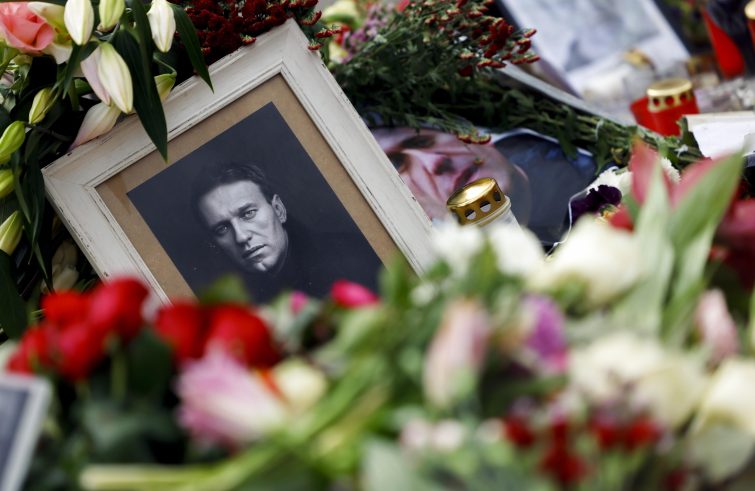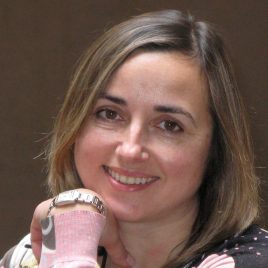
Alexey Navalny, an opponent of the Russian regime, died on February 16 in the IK-3 penal colony in Siberia, just above the Arctic Circle, where he was imprisoned. He was awarded the 2021 Sakharov Prize for Freedom of Thought by the European Parliament. “I clung to the hope that Navalny would be traded in a prisoner swap deal and that the international spotlight on his fate would somehow protect him. But I always feared that he had a slim chance of survival,” said Marina Sakharov-Liberman, granddaughter of the renowned Russian dissident physicist Andrei Sakharov, winner of the 1975 Nobel Peace Prize, in an interview with the weekly newspaper ‘Vita Trentina’. Marina Sakharov-Liberman was friends for many years with Russian physicist Lev Pitaevskii, who obtained a teaching post at University of Trento in the 1990s on the initiative of Professor Sandro Stringari. He had previously collaborated with the Department of Physics and, in particular, with the Centre on Bose-Einstein Condensation, which is now named after him.

Marina Sakharov-Liberman, Navalny was awarded the prize named after his grandfather in 2021. What were the motives? Could you give us a brief outline of the history of the Prize for our readers?
The Sakharov Prize for Freedom of Thought was created in 1988, when Nobel Peace Prize laureate Andrei Sakharov was still alive. Nelson Mandela and Anatoly Marchenko were the first recipients in 1988 of the Sakharov Prize, the highest tribute paid by the European Parliament to human rights work. Alexei Navalny, then a political prisoner, was awarded the Prize in 2021 in recognition of his struggles to end corruption and promote democracy in Russia.
Were you expecting to hear about the death of Alexei Navalny?
I must admit that this question is very disturbing for me because of my childhood memories. In fact, as a child, I had heard a lot about Anatoly Marchenko from my grandfather and my stepmother, Elena Bonner. Marchenko was the first to report on the appalling conditions of political prisoners in the Soviet Union. He died in prison in 1986 after a three-month hunger strike. My grandfather himself nominated Marchenko for the Sakharov Prize, posthumously. Natan Sharansky, another friend of Sakharov’s, spent nine years in the harsh conditions of Soviet prisons. Thanks to a courageous and tireless campaign by his wife, Avital Sharansky, he was finally released in a dramatic exchange at the so-called “Bridge of Spies” in Berlin. So while I held out hope that Navalny might also be the subject of a swap, and that the international spotlight on his fate would somehow protect him, I always believed that he had little chance of survival.
To what extent are the values embodied by Alexei Navalny shared by the Russian population today?
Alexei Navalny’s concerns and aspirations about corruption, democracy, political representation, happiness and the end of the war are certainly shared by many of his compatriots. But at the same time, if I were asked to estimate the level of support for Navalny right now, the answer would be different.
His death prompted spontaneous memorial services and vigils across the country. But citizens have not been allowed to mourn: impromptu memorials were immediately dismantled, flowers were unceremoniously thrown into rubbish bins and, according to the human rights organisation OVD-Info, in the two days following Navalny’s death more than 400 people were detained by police in 36 cities and towns across Russia as they tried to lay flowers on monuments honouring victims of political repression.
It is not easy to comprehend why this regime is terrified of its own people. Conversely, people fear crackdowns and try to shun troublesome thoughts. Navalny has been labelled a criminal, while his organisation has been described as ‘extremist’. Any expression of support for either of them could have serious consequences, so the Russian people are reluctant to openly express their opinions on the matter. Finally, the Russian government has tried to eliminate and criminalise all independent news outlets. As a result, the only source of news for many Russians is state-run television and press. As Dmitry Muratov, Nobel Peace Prize winner and editor of the now defunct independent newspaper ‘Novaya Gazeta’, has pointed out, the majority of the Russian population is constantly exposed to manipulative propaganda, which affects their ability to think independently. The result is often a confusing jumble of contradictory ideas and conspiracy theories.
What is the situation of Russian scientists who are not aligned with Putin’s regime today, and how much freedom do they have?
Scientists in the field of basic research have no obligation to be loyal to a political regime in order to carry out their work. Nevertheless, Russian scientists face a worrying situation. Russia’s scientific research has traditionally played an important role in global academia, but this important international connection has been severely damaged. Many Russian universities and research centres face sanctions from the West. This has made it much more difficult to obtain laboratory equipment, cell culture reagents, software and computers.
Travelling to and from Russia has become a nightmare: with most direct flights suspended and borders closed, travelling via Turkey is one of the few remaining options. It’s a long, arduous and expensive trip, meaning that few Russian scientists can afford to attend international conferences, even if they manage to obtain travel visas.
Moreover, participation in these conferences is not without risk: several investigations against scientists are currently underway in Russia, accusing them of “revealing state secrets” as a result of ‘collaboration’ with scientists from “enemy states” (virtually all European countries, the USA, Canada), even though scientific co-operation is based on publicly accessible research papers. The humanities (history, political and social sciences) are areas where dissent is no longer tolerated.
Are the motivations of today’s dissidents similar or different to those of former opponents of the Soviet Union, as in the case of your grandfather?
I think the underlying motivations are the same: people want to live their lives without being afraid of crackdowns and want to be able to express their opinions; they want to be represented in government, they want a society based on the rule of law, based on respect for citizens’ rights and freedoms.
But today everything is not normal: not only political activists, but also dozens of famous and popular writers, journalists and actors are labelled as “foreign agents”, i.e. enemies of the state.
Every Friday, the list of “foreign agents” is updated with new names. No society can thrive in such a repressive atmosphere.
After the Russian attack on Ukraine two years ago, many Western European scientific and academic institutions decided to reduce their cooperation with Russian institutions. What, in your view, are the consequences of this decision?
The consequences for Russian scientific life are devastating. In the absence of regular scientific cooperation, it is hard to imagine that Russian science will flourish, and this is a lose-lose scenario for the whole world, not just for the Russian scientific community. It is a sad situation, but at a time when EU countries are referred to as “enemy states” and Russian scientists participating in international conferences run the risk of being wrongly accused of being “spies”, and in the case of the humanities censorship can be extreme, normal scientific cooperation is hard to imagine.
What do you think of the announcement by Navalny’s wife, Yulia, that she will continue her husband’s commitment?
Yulia Navalnaya is a brave and strong woman, and she is going to receive plenty of support from her husband’s many thousands of supporters. Wanting to perpetuate her husband’s legacy is a natural human need. Alexei Navalny was an exceptionally brave opposition leader. He connected with crowds of supporters thanks to his strong charisma and a sense of humour that never failed him, as demonstrated the day before his death, when his jailers laughed at his jokes. The multiple arrests he endured – culminating in a decades-long prison sentence – meant that he was no longer able to interact with the crowds of his supporters. Yulia Navalnaya is also not allowed to travel to Russia to receive the support of the crowds: she was informed that she would be arrested on charges of extremism. She stands little chances of continuing her husband’s work. But her dream of one day seeing Russia as a peaceful and democratic country is a dream shared by millions of Russians.
(*) appeared on the journal “Vita Trentina”










